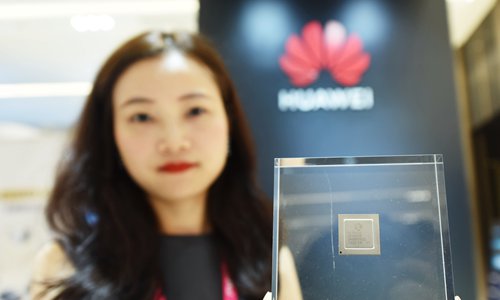SOURCE / INDUSTRIES
SK Hynix to acquire Intel’s NAND business, likely to pressure China

An employee showcases a 5G intelligent Solid State Disk controller chip developed by Huawei at the Flash Memory World in Hangzhou, East China's Zhejiang Province on Thursday. The event, themed "Flash Memory Speeds up Digital Economy" this year, aims to fully show the bright prospects of memory chips' application in the development of artificial intelligence, 5G and the Internet of Things. Photo: IC
US chipmaker Intel is selling its NAND flash business to SK Hynix in a $9 billion deal that would give the South Korean company, together with Samsung, roughly 60 percent of the world's memory chip market.
The deal could ramp up pressure on Chinese memory chipmakers who may face technology hurdles due to South Korea's monopoly, which spans the industrial chain, industry observers said.
Meanwhile, as Chinese device makers including Huawei and Xiaomi source the bulk of their memory chips from South Korean suppliers, some of them may be at risk of having supplies restricted if South Korean firms bow to US pressure amid a heated technology tussle between the world's two largest economies.
SK Hynix confirmed in a statement sent to the Global Times on Wednesday that it would pay $9 billion to acquire Intel's entire NAND business, including associated manufacturing and design patents. Intel's factory in Dalian, Northeast China's Liaoning Province, is included in the deal.
In the first half, SK held about 11.7 percent of the global memory chips market, while Intel had 11.5 percent, according to data. South Korea-based Samsung had a share of 31.4 percent, ranking No.1. After the acquisition deal, the two South Korean companies would together have an overwhelming 60-percent market share in the memory chip sector.
Flash memory chips are used in smartphones, computers, USB storage devices and other everyday electronic devices.
Chinese industry observers said the deal will put pressure on China's fast-growing memory chip industry, as South Korean competitors claim a monopoly on certain patents and have the ability to achieve economies of scale in manufacturing. They could leverage these advantages to rein in the development of Chinese companies.
But SK Hynix on Thursday denied that the planned acquisition would lead to pressure on China, or any degree of monopoly.
"The acquisition is aimed to improve our own NAND business efficiently based on business-oriented decision-making," the company said in a statement sent to the Global Times on Thursday.
Ma Jihua, a veteran industry analyst, told the Global Times on Wednesday that such curbs would not halt the growth of China's memory chips industry, where "every player has scaled up research and development (R&D) and has achieved key breakthroughs."
Ma predicted that China will be able to nurture a complete memory chip industry chain in the next two to three years. "Memory chips may be the first industry segment to see the global center of gravity shift to China," Ma added.
A manager of a Shenzhen-based electronics company, who spoke on condition of anonymity, told the Global Times that some leading tech companies in Shenzhen, such as Huawei and Oppo, have been cooperating with domestic memory chip suppliers and making tech inputs to speed up the R&D process.
"The US has used smartphone chips to curb China's tech rise. Although memory chips have not been targeted yet, Chinese vendors should prepare for the worse case - being cut off from outside supplies - if the tech war escalates," the manager said.
High-tech enterprises including Huawei, Xiaomi, Vivo and Oppo all buy large volumes of chips from South Korean suppliers, according to industry insiders.
Analysts suggested that Chinese chipmakers seize any acquisition opportunity at a time when the global chip industry is undergoing turbulence.
"The US tech war has cast a shadow over the global chip-making sector. As uncertainty persists, the industry will see a wave of mergers and acquisitions. It's a good time for Chinese companies to acquire foreign peers to boost competitiveness," Ma noted.

